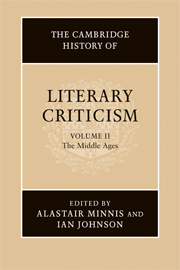Book contents
- Frontmatter
- Introduction
- I THE LIBERAL ARTS AND THE ARTS OF LATIN TEXTUALITY
- II THE STUDY OF CLASSICAL AUTHORS
- III TEXTUAL PSYCHOLOGIES: IMAGINATION, MEMORY, PLEASURE
- IV VERNACULAR CRITICAL TRADITIONS: THE EARLY MIDDLE AGES
- V VERNACULAR CRITICAL TRADITIONS: THE LATE MIDDLE AGES
- VI LATIN AND VERNACULAR IN ITALIAN LITERARY THEORY
- VII BYZANTINE LITERARY THEORY AND CRITICISM
- 26 Byzantine criticism and the uses of literature
- Bibliography
- Index
- References
26 - Byzantine criticism and the uses of literature
from VII - BYZANTINE LITERARY THEORY AND CRITICISM
Published online by Cambridge University Press: 28 March 2008
- Frontmatter
- Introduction
- I THE LIBERAL ARTS AND THE ARTS OF LATIN TEXTUALITY
- II THE STUDY OF CLASSICAL AUTHORS
- III TEXTUAL PSYCHOLOGIES: IMAGINATION, MEMORY, PLEASURE
- IV VERNACULAR CRITICAL TRADITIONS: THE EARLY MIDDLE AGES
- V VERNACULAR CRITICAL TRADITIONS: THE LATE MIDDLE AGES
- VI LATIN AND VERNACULAR IN ITALIAN LITERARY THEORY
- VII BYZANTINE LITERARY THEORY AND CRITICISM
- 26 Byzantine criticism and the uses of literature
- Bibliography
- Index
- References
Summary
A year or so before his death in 1332, at the end of a distinguished career as a scholar and public servant in the imperial court, Theodore Metochites composed his Epistasia kai Krisis, a critical comparison between two preeminent orators in the Greek rhetorical tradition, Aristides and Demosthenes. After setting out their respective stylistic merits at some length and discussing their effectiveness, the profit to be gained from reading their discourses, and the different political circumstances in which they wrote, Metochites announces his verdict. Demosthenes was indeed eloquence incarnate – an opinion shared by the vast majority of his critical predecessors – but it is Aristides who should be awarded the palm. He is, Metochites writes, the more ‘useful’ of the two (§ 31.14–23). Like himself and the readers of this epistasia, Aristides lived under a monarchy and composed a sort of rhetoric appropriate to that political setting.
Metochites' ‘essay’ has been variously praised by scholars as a masterpiece of humanist criticism and condemned for not being literary criticism at all, but the work of an astute politician – which Metochites was. To readers persuaded that ‘literature’ can be set apart from other ‘modes’ of discourse, Metochites' observations may indeed seem odd, perhaps confused or disingenuous, since they appear to confound literary principles and political aims. But Metochites' essay, though by no means a paradigm of Byzantine criticism, is far from atypical. It exhibits a number of presumptions that are more or less constant in the large body of critical literature that extends over six centuries, from Photios in the ninth century to the Fall of Constantinople in 1453.
- Type
- Chapter
- Information
- The Cambridge History of Literary Criticism , pp. 667 - 692Publisher: Cambridge University PressPrint publication year: 2005
References
- 17
- Cited by

